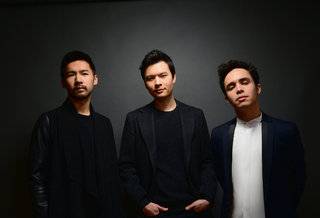|
Back
Romping through a Musical Jungle New York
Weill Recital Hall, Carnegie Hall
05/03/2024 -
John Zorn: Philosophical Investigations
Charles Ives:Piano Trio
Ludwig van Beethoven: Piano Trio in B‑Flat Major “Archduke”, Opus 97
Junction Trio: Conrad Tao (Piano), Stefan Jackiw (Violin), Jay Campbell (Cello)

S. Jackiw, C. Tao, J. Campbell (© Shervin Lainez)
“Music conveys to us itself!”
Ludwig Wittgenstein.
“Beauty in music is too often confused with something that lets the ears lie back in an easy chair.”
Charles Ives
Countless times have I heard and marvelled at more than the exciting virtuosity of cellist Jay Campbell and pianist Conrad Tao. One can easily marvel at their fingers and their intellectual understanding. But more than that, one is astonished at their daring, their need for challenges, their adventure in running, their leaping into the jungles of music.
And in conveying their joy to us, the listener.
This is not to ignore violinist Stefan Jackiw. I had never heard him before last night. But his expertise as the third member of Junction Trio was unquestioned.
The Junction Trio was formed only two years ago, but the reputation of each artist was so great that they are playing everywhere around the United States and Europe. Last night, though, was their Carnegie Hall debut, where their choices were as illuminating as the Weill Hall chandeliers. Specifically, they started with a work they commissioned by John Zorn, continued with the rare Charles Ives Trio, written at the apex of his career in 1915. And they finished with Beethoven’s great ”Archduke” Trio.
All three played with a unity to be envied by more seasoned ensembles.
They started with a work they commissioned by John Zorn. Obviously the Junction Trio didn’t want one of Zorn’s deft pastiches of mod and contemporary. He replied with the impossible. Philosophical Investigations based on that most impenetrable of all philosophers, Ludwig Wittgenstein. And the sounds reflected the sage.
Try to read Wittgenstein, and within a minute you’ll close the book. Opaque aphorisms, rarefied reflections, word upon word of the meaningless meaning of words, all through a super‑erudite eternity.
Mr. Zorn gave Junction Trio crazy opacity. The three artists went into whiplash puzzles, quantum velocity, fingering which defied dexterity–and every so often, Rachmaninoff rhapsodies, turning back to the discombobulations of unplayable music.
Though not unplayable by this trio. And by the way, a hint to Mr. Zorn. Wittgenstein’s favorite movie actor? Carmen Miranda. (Though he loved all Hollywood musicals!) The man and the music defied rationality. And it is one of the most original works by the always surprising Mr. Zorn.
After this, Charles Ives sounded like a doddering old fogey. Of course his Trio was difficult. But by the time he’d quoted and distorted My Old Kentucky Home, Long Long Ago, and the old Evangelical hymn, There is a Fountain Filled with Blood, one felt quite comfortable with the bonkers genius insurance executive.
After all, Ives was playing games. The repetitions of the first movement gave the Junction Trio time to show their solo chops. The finale was lighter, more lyrical, with a few more unidentifiable songs thrown in. But it was the second movement called “TSIAJ (“This Scherzo Is A Joke”) Presto” that Ives went to town. The three artists played in three different keys, the trio whipped up and down their respective keyboards, allowing the 1880’s songs and hymns to peep and disappear like mice darting in and out of their holes.
After the intermission, the Junction Trio returned to reality. Or the reality of blessed un‑obfuscated sounds. The “Archduke” is Beethoven without tears, without hilarity. Simply a work of utmost deftness, and here played by three splendid players. The first movement never dragged, the colors were light, Mr. Jackiw’s playing shone through with lighthanded joy. If the scherzo wasn’t quite playful enough, these three emphasized Beethoven’s shifts in color, the active chromatic sections.
The third Andante showed Junction Trio’s sensitivity when needed. That theme has the inspiration of a Schubert and was given a sober no‑nonsense interpretation. Which, of course led without pause to Beethoven’s joyous finale. This was rhythmic, buoyant, and even the minor‑key segments were never over‑serious, a splendid ending to these always youthful artists.
Harry Rolnick
|